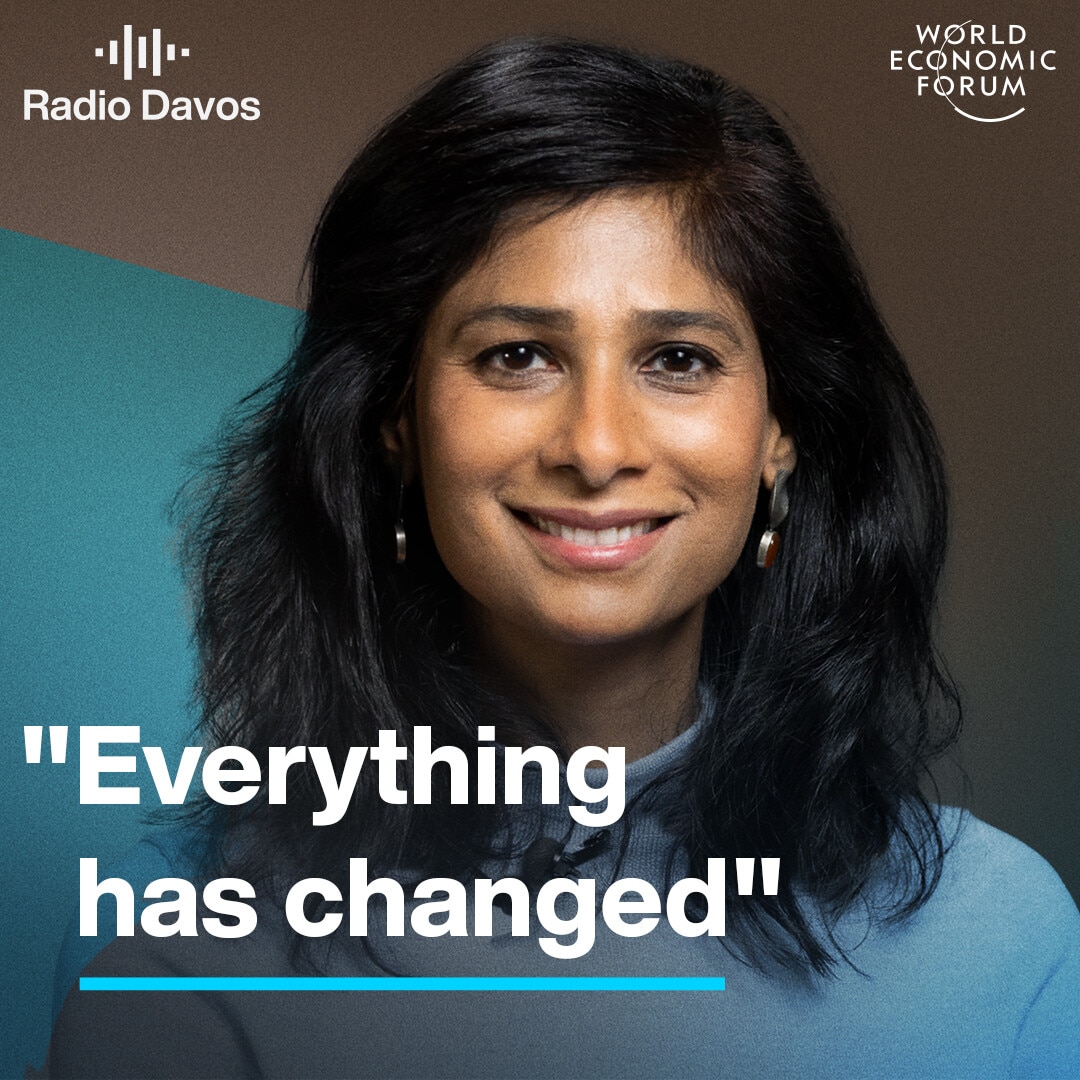More than just a toothache: how to tackle the huge costs of poor oral health
播客文字稿
This transcript has been generated using speech recognition software and may contain errors. Please check its accuracy against the audio.
Marko Vujicic, American Dental Association: It's one of the most common health conditions across the globe. We're talking about 3.5 billion people worldwide
Robin Pomeroy, Radio Davos: Welcome to Radio Davos, the podcast from the World Economic Forum that looks at the biggest challenges and how we might solve them. This week: what’s the health condition that affects us all, but is often seen as an add-on for healthcare - and how much is this neglect costing the economy?
Marko Vujicic: When you look at the economic burden globally, it's about a $710 billion tax every year.
Robin Pomeroy: Open wide - we’re going to the dentist's to look at a new report that lays bare the economic and personal costs of failing to look after our teeth and mouths.
Marko Vujicic: 29% of low-income Americans say that their job prospects are limited due to the condition of their mouth and teeth.
Robin Pomeroy: And it’s far from being just a ‘first world problem’.
Marko Vujicic: The largest increases in the burden of disease are actually happening in low income countries.
Robin Pomeroy: The report - The Economic Rationale for a Global Commitment to Invest in Oral Health – sets out the potential returns on investing more in oral health - and it’s not just about our teeth.
Marko Vujicic: When oral health improves, for example, among diabetes, pregnant people, people with cardiovascular disease, people with dementia, their health care costs go down. So if we invest in oral health, we see health care cost savings in other parts of the health care system.
Robin Pomeroy: Subscribe to Radio Davos wherever you get your podcasts, or visit wef.ch/podcasts.
I’m Robin Pomeroy at the World Economic Forum, and with this look into filling the gaps in oral health...
Marko Vujicic: We all know mouth is connected to body, and we need to stop paying that economic penalty for neglecting oral diseases.
Robin Pomeroy: This is Radio Davos.
Welcome to Radio Davos. And this week we're going to the dentist's. A new report from the World Economic Forum found that half the world's population is affected by oral diseases - 3.5 billion people - with huge impacts, obviously, on their oral, their dental health, but also on other health conditions and on the economy. But oral health is often seen as quite separate from other health conditions and is often underfunded or excluded from health insurance schemes.
To tell us more about that research and what should be done. I'm joined by Marko Vujicic, chief economist, vice president, Health Policy Institute at the American Dental Association. Marco, did I get all that right?
Marko Vujicic: You did. Thank you.
Robin Pomeroy: You co-wrote this report. This is the report called The Economic Rationale for a Global Commitment to Invest in Oral health. Can you give us some of the headlines from that?
Marko Vujicic: Sure. So as you mentioned, I'm not a health practitioner. I'm a health economist. But more importantly, about a year ago, the World Economic Forum formed an Oral Health Affinity Group. I'm one of the co-chairs, as you mentioned, Alli Neale from Henry Schein and Maria Ryan from Colgate-Palmolive were my other two co-chairs.
And yes, we have worked diligently on trying to pull together all that we know about the economic impact of oral health. So a couple of headlines. It's one of the most common health conditions across the globe. So we're talking about 3.5 billion people worldwide affected by oral diseases.
Robin Pomeroy: What do you mean by oral diseases.
Marko Vujicic: These are things like gum disease, caries which causes cavities. Oral cancers are one of the fastest growing cancers. Now that we have better and better data. So conditions that affect the health of your mouth, some of them are common, some are less common, but obviously very, very prevalent.
For context, about a billion people suffer from mental disorders worldwide. Half a billion, cardiovascular disease. So it's a very, very common condition that a lot of people experience.
Unfortunately, the disease burden is growing. But from the economic standpoint, I think probably the one headline that really stuck out when we looked at the data was when you look at the economic burden globally of oral diseases, it's about a $710 billion tax every year, let's think about it, on the global economy.
Roughly half of that is productivity losses. So people can't work. They can't go to school because of oral health diseases. And that productivity loss stemming from oral diseases is more than, for example, asthma globally. It's more than cardiovascular disease. It's in the line of Alzheimer's. So it's in the top ten, let's say.
Oral health is really driving economic losses. And that's something we haven't really talked about enough. We're paying an economic penalty for neglecting oral diseases.
Robin Pomeroy: Remind us that figure again, kind of the dollar figure of of losses.
Marko Vujicic: So overall it's 710 billion in economic losses worldwide. And roughly half of that, 323 billion each year, is productivity losses.
Robin Pomeroy: It's a very new report. It's only been out for a couple of weeks. But the people who've seen it so far, did it make them step back? Or are the people who are reading this they knew this already?
Marko Vujicic: Well, it's I say there's two camps, right? Let's say the oral health community or the advocates for oral health that obviously are committed to the cause and knew this, but did not have the scientific basis for a lot of these arguments.
We really tried to be disciplined in this report to cite the scientific literature. So look, when you're talking to ministries of finance or ministries of labour and education and development, you know, you got to stand on some evidence, right? So we really worked hard to pull that together.
The second audience is kind of the broader community of oral health, civil society, the private sector. And yes, the feedback so far has been like, well, we kind of knew oral health was out there and separate and people had challenges. But wow, when you put it all together in some of these charts and reports, we've definitely gotten feedback so far, certainly from the policymakers. You know, there was a group of us recently at the World Health Assembly out in Geneva, at WHO. and more and more conversations are happening about this. I mean, WHO has launched an action plan that is really compelling, saying, okay, here's what ministries of health, here's what countries can do, here's what the private sector can do.
So there's momentum building, I would say, but we're just starting here. And it's amazing for a group like the World Economic Forum, this has been super exciting for somebody like me that's worked in health policy. It's a whole other set of stakeholders and a whole other set of arguments and value propositions we're able to bring forward. So we're excited to go forward with this.
Robin Pomeroy: One thing that comes very clear in the report, and it's just obvious to most of us, is that oral health or dental health is often seen quite separately from your other health. I mean, I live in Switzerland. In this particular health care system, which is very Swiss, very different from anywhere else. You have health insurance, but usually it doesn't cover dental health at all. That's completely separate thing. I'm from the UK and there's absolute crisis there where health care is free at the point of delivery. But it's very, very difficult actually to get onto an NHS dentist's list. And I think there's similar but different situations in various countries and economies. But why is it seen as so separate?
Marko Vujicic: First of all, it's really important to highlight that, as fact. you look at OECD, you look at developing nations, you look at different regions: consistently dental care services or oral health care services are consistently the health care service that stands out in terms of barriers to care, particularly financial barriers.
So if I compare dentistry to prescription drugs, to mental health care services, to specialised care, speciality care - boom, dental care and oral health care services are usually the service that people have the toughest time affording and getting to. So it echoes your your personal experience. So there's very strong evidence on that.
Why we came to this position. There's just a long history of kind of like mental health 20, 30 years ago, it wasn't seen as core primary care. That transition has happened over two, three decades. Oral health is kind of that same starting point where it just wasn't considered like kind of above the neck, right, eyes, ears, mental health tended to be not really and historically included as part of core health care. So that's changing now.
And whether you're in Switzerland or in other places, you typically do find that dentistry is either financed separately, largely out of pocket, and delivered separately.
So a really interesting statistic we found, for example, in the OECD, on average, the developed countries, 26% on average of health care spending is financed privately, and the rest is through public insurance programs. For oral health care services, 70% on average is financed privately.
So what you just said, right, it is a very different decision, right. We're kind of like, okay, this is largely going to be out-of-pocket payments or private dental insurance plans. It's not going to be part of core, for example, in the UK it is. It's one of those rare cases, but typically it's not included in large national health insurance programs, etc., With some exceptions.
One of the things we really wanted to drive home was, like the last decade, has seen a lot of compelling evidence showing oral health is linked to broader health care costs. So we know that when oral health improves, for example, among diabetes, pregnant people, people with cardiovascular disease, people with dementia, their health care costs go down. So if we invest in oral health, we see health care cost savings in other parts of the health care system.
We didn't have that kind of compelling evidence ten, 20 years ago. We have that now. So we're hoping that even for the finance people, the numbers people, the economists, there's also a pretty compelling case to say, I should invest more in oral health because it saves me costs downstream.
The question you're raising is right now, how do we organise the health care system such that it does that? How do we get more people access to oral health care? How do we leverage some of these ROIs, let's say.
Not to mention the job market, right. So I live in the United States. 29% of low income Americans say that their job prospects are limited due to the condition of their mouth and teeth. So that is a significant personal household cost we're paying pain.
We know in low income countries, very large study we cited, based on World Health Survey data, households that have high out-of-pocket costs due to oral health issues are more likely to be impoverished.
So there's all sorts of these compelling arguments, and we're hoping now we can say, okay, let's act. What do we do about this? What are some policy reforms we should consider?
Robin Pomeroy: So you mentioned there that there are links between the health of the mouth, the teeth, the gums and these other things. I mean, to cite the report, better oral health has been associated with improved outcomes for people suffering from heart disease, respiratory disease, diabetes, dementia, arthritis, and for pregnant women. Now, I know you're not a doctor. You're a health economist, but can you give us some idea of why are these things linked to oral health?
Marko Vujicic: With the caveat that I'm not a clinician, not a scientist, but more of a numbers guy - it's multi-directional, right? So a lot of these studies essentially float around inflammation. So when you have inflammation in your mouth, in your gums, that shows up as inflammatory symptoms in other parts of the body. Not going too deep into the signs which I am not an expert on at all. That's one of the core ones. Obviously, bacteria in the mouth are linked with other parts of the body too. The mouth, biologically, is the gateway to the rest of the body, so to speak. So there's a whole kind of microbiology link there as well. But a lot of this results just around inflammation. Oral cancer is different. That's as I mentioned, one of the fastest rising types of cancers worldwide. There might be better measurement, tracking it better, diagnosing it better.
Robin Pomeroy: This is a global survey. There must be massive regional differences. You've already mentioned it. Although poorer countries will have different health care systems, even more underfunded presumably than the wealthier countries, you're still seeing this similar thing. A lot of people suffer with oral health problems, and that inhibits their ability to work, to earn. There's kind of similarities all over the world for this
Marko Vujicic: So this you got it. But with the caveat, and this is important for the health equity agenda, the largest increases in the burden of disease are actually happening in low income countries. Regionally there's differences as well.
But I do want to highlight that there is an important health equity angle here, right. It's the low income populations that are suffering most from this unmet needs and the burden of oral health diseases. And again, that's true when I look geographically across the globe as well as within a country. Right. So if you take Switzerland or the UK or Canada, when you look within countries, the disparities with oral health outcomes are typically much larger than for other types of health care services as well.
Robin Pomeroy: It's bound to be that way, isn't it? If oral health treatment is an expensive kind of add on to existing health services, poorer people in any society are going to be more reluctant to seek it out.
Marko Vujicic: Correct. So it stems from the fact that, you know, in most settings, we have not put oral health care services into that core basket of essential care that tends to be covered and mandated in either large NHS type systems or even, you know, in the US, like an Affordable Care Act. Even though there's private insurance, we have regulations on what it needs to cover. And oral health for adults is, for example, here in the US, not been part of that care basket.
And it's exactly because of those choices, right? So I wouldn't say expensive necessarily. If we had to pay 50% of our heart valve procedure cost, we would probably say, hey, that's super expensive, right? To me, it's more about the choice that, hey, we're saying finance this privately out of pocket. It's not core. The rest of this primary care, you'll be covered. That's what's driving this affordability challenge is just as you said it. That's obviously going to bite much harder for low income, financially constrained households. And that's exactly what we're seeing in the data.
Robin Pomeroy: So what needs to change? You mentioned you were attending the World Health Organisation meeting. You're talking to policymakers. What are you hoping will happen? What will be the knock on effect of this paper that you've published?
Marko Vujicic: We highlighted four areas of action among policymakers.
One is to adopt health financing policies that address the financial barriers to care. And that's very broad. So if you're in a largely publicly financed system, you're going to work through your NHS type of insurance model. If you're in a Bismarckian or a hybrid scheme where there's privately provided health insurance, you can regulate that to say, hey, include these core health care services.
Area two is on the delivery side. Integrate oral health into primary care touchpoints. Right. So not have this separate delivery system. And there's lots of great examples around the world where that's happening.
Third is we're going to have to look at different types of workforce models. Kind of the OECD Western country workforce model will not be appropriate in low income settings. So we need to do some meaningful reforms there.
The fourth one we haven't talked about much is really focus on upstream prevention and promoting healthy behaviours. There's sugar consumption and whether you drink fluoridated water or use fluoride toothpaste. These are at home behaviours that are really important. But there's ways policymakers can incentivise those. For example taxing sugar sweetened beverages. There's some experiments there.
So number one address the financing gap. Number two integrate oral health care services into primary care. Number three explore innovative workforce models. And number four adopt policies that promote healthy habits upstream.
Robin Pomeroy: If we were to take those recommendations, would there still be barriers to that? Is it just that countries or organisations, hospitals or doctors groups or whatever need to change a bit their outlook? It's often hard to effect change in health care or other parts of the economy. What do you see as the big barriers preventing this?
Marko Vujicic: I can see a few. You mentioned a big one, right? There's always on the, let's say on the practitioner community, and this is not unique to oral health, there's long histories of for example, workforce reform tends to be controversial to those in the status quo. So there's definitely potentially resistance among some pockets of the provider community.
Potentially you're competing for health care dollars for other things that also have a return on investment. Oral health is not the only thing that drives better job prospects or better school outcomes. We have compelling evidence that it does, certainly. But, you know, so does mental health and so do other types of investment.
And that's not a bad thing, right. Policymakers should look at all this.
But thankfully we also in the report highlight cases where we've broken through those barriers. Countries have addressed some of those resistances. You know, we highlight the case, you know, Japan, Germany, two countries, big public investments in oral health, very low barriers to oral health care services, lots of access. Good stories.
Thailand, Brazil, another set of countries that have had a long history of actually including oral health care as part of their universal coverage. That's another thing, right? We have examples where countries have sort of bucked the global trend and said, no, no, no, no, no, health care for your mouth is essential.
Robin Pomeroy: And in those examples in those countries, are you seeing improvements to the kind of metrics that you're measuring here in this paper.
Marko Vujicic: Where we have data and where we're able to make those assessments, yes, that's why they were included.
But there's a whole other wonky discussion we could have on research. Like, we struggled and we went really hard to put it in kind of the scientific literature. There's so much that we can do better in terms of tracking, evaluating policy reform. That's for another discussion. That's for the researchers and the scientists.
But yes, in the paper you can see some very nice case studies where you see, you know, in Japan tooth retention has skyrocketed, the burden has been managed much better, etc. Thailand, many more people going to the dentist. So yes we do.
Robin Pomeroy: So where do things go from here? You've published this report. You've mentioned this grouping called the Oral Health Affinity Group, which is made up of, I'm reading here, more than 50 companies committed to advancing health equity to create stronger, more productive societies. So will the work of that group will continue now?
Marko Vujicic: We feel this is just the start.
So the point of this first piece was to say, let's get something out that makes the economic case. That is just the starting point.
And we feel our next steps, number one, are obviously getting the word out. But we really want to leverage the Forum's ability to kind of convene and to host some listening sessions, let's say. We think this is really important. We think this is impactful. We think this will push people to act. But let's actually sit with the people, the leaders in civil society, the private sector and governments. And let's ask them, hey, what would make you go all in on this? Is it more evidence? Is it a political economy issue? Is it? I don't know what to do. In which case, what are the right policies? Right. What works in my setting?
We're not a group that thinks we have the answers at all. We're exploring that. I don't have solid answers yet, but we're just that the starting point.
We are at a great moment where we're going to see a lot of action on oral health in the coming years. This is exciting. And we all know mouth is connected to body, and we need to stop paying that economic penalty for neglecting oral diseases.
Robin Pomeroy: Marko Vujicic, Chief Economist & Vice President, Health Policy Institute at the American Dental Association. The report he was talking about was published by the World Economic Forum in collaboration with the American Dental Association, Colgate-Palmolive Company and Henry Schein, Inc. You can read it on our website - links in the show notes.
The World Economic Forum’s Centre for Health and Healthcare is committed to pioneering strategies that enhance global healthcare, ensuring the well-being of people across societies and nations. For more initiative on health care - visit the Centre’s website - links in the show notes.
Please subscribe to Radio Davos wherever you get your podcasts and please leave us a rating or review. And join the conversation on the World Economic Forum Podcast club on Facebook.
This episode of Radio Davos was presented by me, Robin Pomeroy. Editing was by Jere Johansson. Studio production was by Taz Kelleher.
We will be back next week, but for now thanks to you for listening and goodbye.
Scroll down for full podcast transcript - click the ‘Show more’ arrow
Half the world’s population - 3.5 billion people - are affected by oral diseases, with huge impacts on other health conditions and on the economy. But oral health is often seen as quite separate from other health conditions and is often underfunded or excluded from health insurance schemes.
Marko Vujicic, Chief Economist & Vice President, Health Policy Institute at the American Dental Association, co-authored a report called "The Economic Rationale for a Global Commitment to Invest in Oral Health" and joins Radio Davos to tell us more.
Links:
The Economic Rationale for a Global Commitment to Invest in Oral Health: https://www.weforum.org/publications/the-economic-rationale-for-a-global-commitment-to-invest-in-oral-health/
Half the world is affected by oral disease – here’s how we can tackle this unmet healthcare need: https://www.weforum.org/agenda/2024/05/oral-health-crisis-global-equity-affordable-dental-care/
Global Health Equity Network: https://initiatives.weforum.org/global-health-equity-network/
Related podcasts:
Check out all our podcasts on wef.ch/podcasts:
话题:
健康与医疗系统分享:
更多集:
每周 议程
每周为您呈现推动全球议程的紧要问题(英文)











